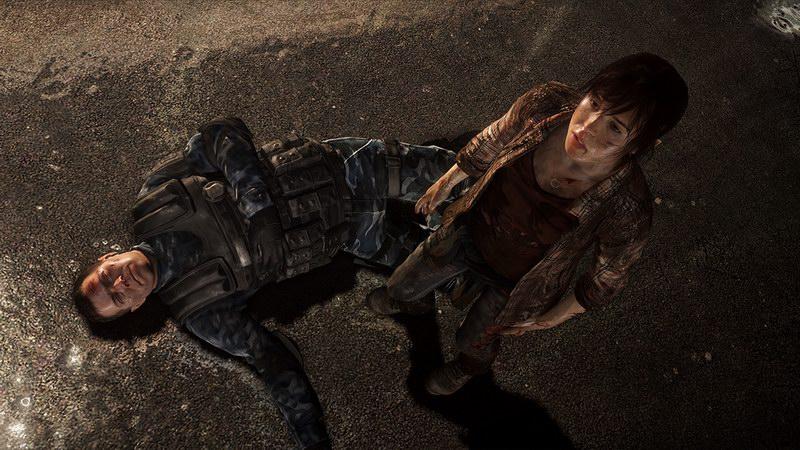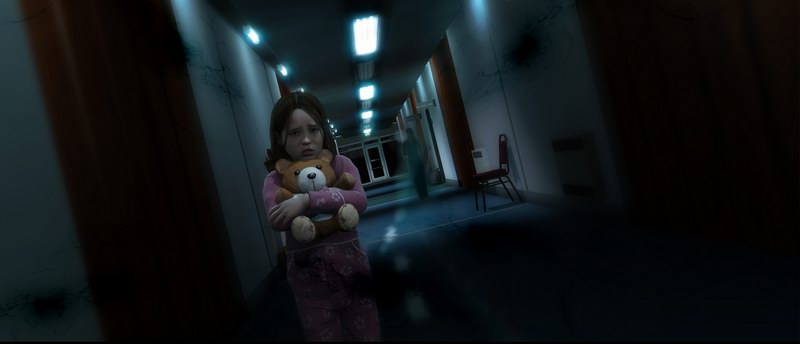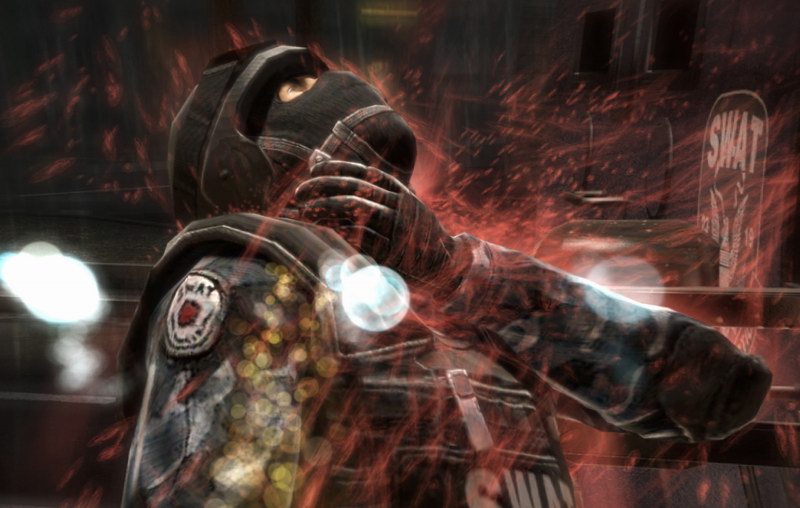Beyond: Two Souls | reviews, news & interviews
Beyond: Two Souls
Beyond: Two Souls
Ellen Page shines in a stunning interactive story, but where's the game?

Stunningly good entertainment, interesting art, rubbish game. Beyond: Two Souls does more than any other videogame around to further the cause of interactive narrative fiction – sadly, by jettisoning most of the "interactive" bit.
Beyond: Two Souls predecessor is 2010's Heavy Rain. It's probably one of the most important videogames of the last ten years. Ostensibly an update of the old "point-and-click" adventure genre, you play as four characters whose lives cross in a rainy city – your job is to choose dialogue options, solve puzzles and occasionally grapple with action sequences where you hit buttons in time to prompts on-screen in order to smash your way out of a car, shoot your way through a gangster's mansion or, even, to play basketball in the rain while mourning your son.
What was revolutionary about Heavy Rain was not its gameplay, but its thematic depth (loss was a recurring theme) and its avoidance of stereotypical game approaches (the main character was a grieving architect). In its wake, game stories suddenly grew up – even shooter terrorist fodder needed sob-story backstories and tragedy-tinged narrative arcs.
 Now, its successor, Beyond: Two Souls, significantly ups some antes while dialing back on others. This is the story of a young girl, Jodie, tied to a mysterious spirit entity she calls "Aiden". The game runs through out-of-sequence key scenes in her life, cleverly foreshadowing and revealing plot points as it does. We see her on the run from a shadowy SWAT team, using her powers for the CIA and as a child growing up "not like others".
Now, its successor, Beyond: Two Souls, significantly ups some antes while dialing back on others. This is the story of a young girl, Jodie, tied to a mysterious spirit entity she calls "Aiden". The game runs through out-of-sequence key scenes in her life, cleverly foreshadowing and revealing plot points as it does. We see her on the run from a shadowy SWAT team, using her powers for the CIA and as a child growing up "not like others".
Throughout, Jodie is superbly played by Ellen Page. Her mentor is Willem Defoe. Both are (and this is rare for videogames) not just lending their voice and likeness, but are fully motion-captured. The result is stunning – an utterly real, immersive and emotional drama. Page plays Jodie from young child to young adult particularly well – and the entire game really hangs on her.
 Page makes Jodie believable, makes you feel for her, and makes you feel her link to Aiden, whom you can also control, is real. With her, the game is gripping. Without her? It'd be second-string sci-fi. Because there's far too little gameplay almost to call this a game.
Page makes Jodie believable, makes you feel for her, and makes you feel her link to Aiden, whom you can also control, is real. With her, the game is gripping. Without her? It'd be second-string sci-fi. Because there's far too little gameplay almost to call this a game.
In Heavy Rain, emotional key moments had decisions attached – and it was clear those decisions would have ramifications. Here, with a chronologically jumbled narrative, it's unclear how your decision to take revenge or not on teenage bullies, or to steal money from a cashpoint when you're starving or not, plays out. That, combined with the fact the play in the game is even more minimal than its predecessor, almost robs Beyond of its interactive status.
Pause and you'll realise how little play there is to the game, but it often barely matters – despite yourself, you'll be shoving the controller, hammering buttons to get Jodie up the stairs in thick smoke, trying to rescue a mother and baby in a burning building – because you believe you are responsible, because you care. And that, ultimately is what makes Beyond great entertainment, but yes, a pretty poor game.
- Beyond: Two Souls is out now. Developed by Quantic Dream and published by Sony Computer Entertainment Europe. Platform: PS3
- Read other gaming reviews on theartsdesk
rating
Share this article
Add comment
The future of Arts Journalism
You can stop theartsdesk.com closing!
We urgently need financing to survive. Our fundraising drive has thus far raised £49,000 but we need to reach £100,000 or we will be forced to close. Please contribute here: https://gofund.me/c3f6033d
And if you can forward this information to anyone who might assist, we’d be grateful.

Subscribe to theartsdesk.com
Thank you for continuing to read our work on theartsdesk.com. For unlimited access to every article in its entirety, including our archive of more than 15,000 pieces, we're asking for £5 per month or £40 per year. We feel it's a very good deal, and hope you do too.
To take a subscription now simply click here.
And if you're looking for that extra gift for a friend or family member, why not treat them to a theartsdesk.com gift subscription?
more Gaming
 'We are bowled over!' Thank you for your messages of love and support
Much-appreciated words of commendation from readers and the cultural community
'We are bowled over!' Thank you for your messages of love and support
Much-appreciated words of commendation from readers and the cultural community
 Kelly Clancy: Playing with Reality - How Games Shape Our World review - how far games go back
The acclaimed neuroscientist on the world and history of games, in all their variety
Kelly Clancy: Playing with Reality - How Games Shape Our World review - how far games go back
The acclaimed neuroscientist on the world and history of games, in all their variety
 Rage 2 review – garish but great post-apocalyptic shooter
Challenge The Authority in this 'Mad Max on mushrooms' renegade romp
Rage 2 review – garish but great post-apocalyptic shooter
Challenge The Authority in this 'Mad Max on mushrooms' renegade romp
 World War Z review - bloodthirsty fun with the zombie apocalypse
Chainsawing the brain-eaters as you battle against the tide of the undead
World War Z review - bloodthirsty fun with the zombie apocalypse
Chainsawing the brain-eaters as you battle against the tide of the undead
 The Lego Movie 2 Videogame review - everything is not awesome
Few fresh ideas means this movie adaptation treads the same old ground
The Lego Movie 2 Videogame review - everything is not awesome
Few fresh ideas means this movie adaptation treads the same old ground
 Anthem review - singing praises? More like a cautious nod
A rocky start for a new franchise that offers potential and problems in equal measure
Anthem review - singing praises? More like a cautious nod
A rocky start for a new franchise that offers potential and problems in equal measure
 Crackdown 3 review - spectacular super-powered action that was great fun many years ago
Nearly a decade has passed since the last incarnation but little has changed in this stagnant shooter
Crackdown 3 review - spectacular super-powered action that was great fun many years ago
Nearly a decade has passed since the last incarnation but little has changed in this stagnant shooter
 Battlefield V review - WWII on an epic scale
The veteran series returns for another ambitious tour of duty
Battlefield V review - WWII on an epic scale
The veteran series returns for another ambitious tour of duty
 Fallout 76 review - how to wreck a perfectly good legacy with one messy game
When home runs go horribly wrong
Fallout 76 review - how to wreck a perfectly good legacy with one messy game
When home runs go horribly wrong
 Red Dead Redemption 2 review - the cowboy drama makes a triumphant return
An ambitious Wild West odyssey that matches epic scale with benchmark skill
Red Dead Redemption 2 review - the cowboy drama makes a triumphant return
An ambitious Wild West odyssey that matches epic scale with benchmark skill
 Call of Duty: Black Ops 4 review – less is more
Solo rations have been relegated from this benchmark war series
Call of Duty: Black Ops 4 review – less is more
Solo rations have been relegated from this benchmark war series
 FIFA 19 review - the best just got a bit better
It looks and plays great, but what’s new?
FIFA 19 review - the best just got a bit better
It looks and plays great, but what’s new?

Comments
Your mileage may vary, but